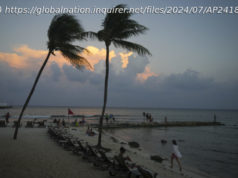In “The Wall,” Britain — spared during a catastrophic global environmental disaster — barricades itself inside a massive concrete barrier.
THE WALL By John Lanchester
Earlier this year, The Times reported that President Trump’s pledge to build a border wall had been invented by his advisers as “a memory trick” to keep an unpredictable candidate focused on the issue of immigration. This tells us a lot about Trump, but it also speaks to the power of the wall as a symbol, which is both monumental in its simplicity and elusive enough to sustain any number of meanings, often based — as Ursula K. Le Guin notes in “The Dispossessed” — on which side of it the observer happens to stand.
This is the wall that fascinated Jorge Luis Borges, who marveled that the emperor who ordered the construction of the Great Wall of China also burned all of the books in his kingdom; and Pink Floyd, who put it on the cover of an album about a celebrity who dreams of becoming a dictator. John Lanchester’s new novel, also called “The Wall,” arrives at a moment in which the definition of a wall is a matter of national debate, and it actively invites such associations. As the main character says on the first page, as he searches for words to describe the wall of the title, “You look for metaphors.”
The narrator is a young man with the Kafkaesque name of Joseph Kavanagh. He has just arrived at the Wall, “a long low concrete monster” that runs for thousands of kilometers around the periphery of an unnamed island nation, closing it off completely from the outside world. All citizens are required to serve there for two years as Defenders, forming the last line of resistance against the threat of an armed invasion. This recalls the Night’s Watch of “Game of Thrones,” except that the country is recognizably Britain, and the enemies on the other side aren’t supernatural White Walkers, but human beings in rowboats and dinghies.






